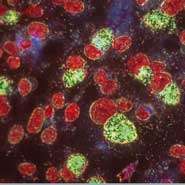Study suggests chlamydia infection rates have changed over time but remains common among young women

(Medical Xpress)—A study exploring the frequency of chlamydia antibodies among young women – a marker for current and past infection – found this increased between 1993 and 2002, and then declined from 2007 to 2010. The first ever English population-based study of chlamydia antibodies, led by researchers from the University of Bristol, Public Health England and Imperial College, published today [21 Aug] in PLOS ONE.
Many women infected with chlamydia develop antibodies, and as such, the frequency with which these can be detected indicates the relative frequency of infection, and possibly also the risk of reproductive health consequences. Analysing samples from 4,732 women aged 17 to 24-years, the researchers found antibodies in around 20 per cent (826), confirming the high frequency of this STI in young women.
Between 1993 and 2002, there was an increase in the frequency of chlamydia antibodies, which is understood to reflect increasing transmission of chlamydia during these years. However, between 2007 and 2010, there was a decrease. Declines in the frequency of chlamydia antibody were concurrent with increased rates of screening.
Dr Paddy Horner, one of the study lead authors, from the School of Social and Community Medicine, University of Bristol, said: "While chlamydia infection remains worryingly common in young women, the decline in prevalence during this recent period of time is striking. Although we can't say definitively, the findings indicate that increased screening may be reducing rates of chlamydia infection and its consequences in young people.
"However, whilst these results are encouraging it is important to remember that many people with chlamydia don't experience any symptoms and so don't know they have it. This is why it remains important that sexually active young adults get screened regularly."
Chlamydia is the most common bacterial sexually transmitted infections (STI) in England, and can lead to serious reproductive health consequences if left untreated, including infertility. The National Chlamydia Screening Programme (NCSP) was introduced in England in 2003, recommending young adults get tested annually or on change of sexual partner. The aim of the NCSP is to control chlamydia through early detection and treatment of asymptomatic infection, so reducing onward transmission and the consequences of untreated infection.
More information: Homer, P. et al. C. trachomatis pgp3 antibody prevalence in young women in England, 1993-2010, PLOS ONE. dx.plos.org/10.1371/journal.pone.0072001













